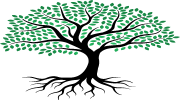
 Carl & Elaine (Grove) Rhodes' Genealogy Pages
Carl & Elaine (Grove) Rhodes' Genealogy PagesThis site is dedicated to our forebears , and their descendants
The site is temporarily unavailable while we update our database. Please try again in a few minutes. If the site remains down for an extended period of time, please contact the site owner.
If we know where we came from; we way better know where to go. If we know who we came from; we may better understand who we are